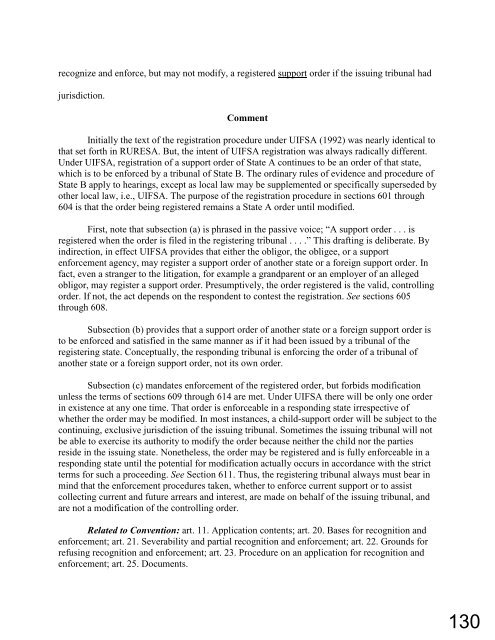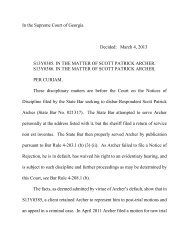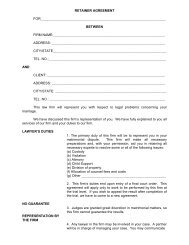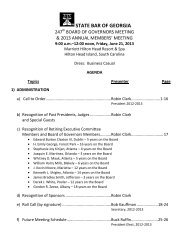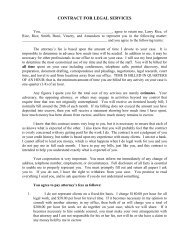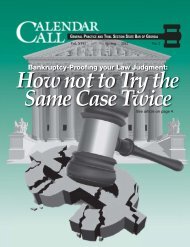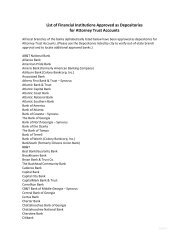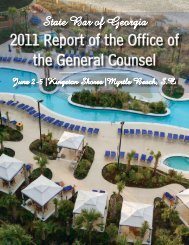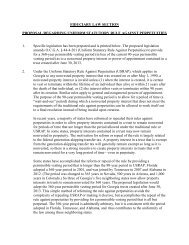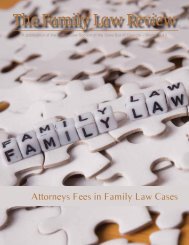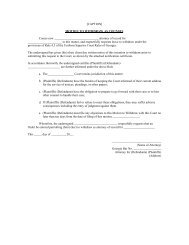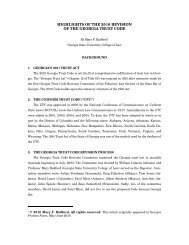2008 Amendments to the Uniform Interstate Family Support Act ...
2008 Amendments to the Uniform Interstate Family Support Act ...
2008 Amendments to the Uniform Interstate Family Support Act ...
Create successful ePaper yourself
Turn your PDF publications into a flip-book with our unique Google optimized e-Paper software.
ecognize and enforce, but may not modify, a registered support order if <strong>the</strong> issuing tribunal had<br />
jurisdiction.<br />
Comment<br />
Initially <strong>the</strong> text of <strong>the</strong> registration procedure under UIFSA (1992) was nearly identical <strong>to</strong><br />
that set forth in RURESA. But, <strong>the</strong> intent of UIFSA registration was always radically different.<br />
Under UIFSA, registration of a support order of State A continues <strong>to</strong> be an order of that state,<br />
which is <strong>to</strong> be enforced by a tribunal of State B. The ordinary rules of evidence and procedure of<br />
State B apply <strong>to</strong> hearings, except as local law may be supplemented or specifically superseded by<br />
o<strong>the</strong>r local law, i.e., UIFSA. The purpose of <strong>the</strong> registration procedure in sections 601 through<br />
604 is that <strong>the</strong> order being registered remains a State A order until modified.<br />
First, note that subsection (a) is phrased in <strong>the</strong> passive voice; “A support order . . . is<br />
registered when <strong>the</strong> order is filed in <strong>the</strong> registering tribunal . . . .” This drafting is deliberate. By<br />
indirection, in effect UIFSA provides that ei<strong>the</strong>r <strong>the</strong> obligor, <strong>the</strong> obligee, or a support<br />
enforcement agency, may register a support order of ano<strong>the</strong>r state or a foreign support order. In<br />
fact, even a stranger <strong>to</strong> <strong>the</strong> litigation, for example a grandparent or an employer of an alleged<br />
obligor, may register a support order. Presumptively, <strong>the</strong> order registered is <strong>the</strong> valid, controlling<br />
order. If not, <strong>the</strong> act depends on <strong>the</strong> respondent <strong>to</strong> contest <strong>the</strong> registration. See sections 605<br />
through 608.<br />
Subsection (b) provides that a support order of ano<strong>the</strong>r state or a foreign support order is<br />
<strong>to</strong> be enforced and satisfied in <strong>the</strong> same manner as if it had been issued by a tribunal of <strong>the</strong><br />
registering state. Conceptually, <strong>the</strong> responding tribunal is enforcing <strong>the</strong> order of a tribunal of<br />
ano<strong>the</strong>r state or a foreign support order, not its own order.<br />
Subsection (c) mandates enforcement of <strong>the</strong> registered order, but forbids modification<br />
unless <strong>the</strong> terms of sections 609 through 614 are met. Under UIFSA <strong>the</strong>re will be only one order<br />
in existence at any one time. That order is enforceable in a responding state irrespective of<br />
whe<strong>the</strong>r <strong>the</strong> order may be modified. In most instances, a child-support order will be subject <strong>to</strong> <strong>the</strong><br />
continuing, exclusive jurisdiction of <strong>the</strong> issuing tribunal. Sometimes <strong>the</strong> issuing tribunal will not<br />
be able <strong>to</strong> exercise its authority <strong>to</strong> modify <strong>the</strong> order because nei<strong>the</strong>r <strong>the</strong> child nor <strong>the</strong> parties<br />
reside in <strong>the</strong> issuing state. None<strong>the</strong>less, <strong>the</strong> order may be registered and is fully enforceable in a<br />
responding state until <strong>the</strong> potential for modification actually occurs in accordance with <strong>the</strong> strict<br />
terms for such a proceeding. See Section 611. Thus, <strong>the</strong> registering tribunal always must bear in<br />
mind that <strong>the</strong> enforcement procedures taken, whe<strong>the</strong>r <strong>to</strong> enforce current support or <strong>to</strong> assist<br />
collecting current and future arrears and interest, are made on behalf of <strong>the</strong> issuing tribunal, and<br />
are not a modification of <strong>the</strong> controlling order.<br />
Related <strong>to</strong> Convention: art. 11. Application contents; art. 20. Bases for recognition and<br />
enforcement; art. 21. Severability and partial recognition and enforcement; art. 22. Grounds for<br />
refusing recognition and enforcement; art. 23. Procedure on an application for recognition and<br />
enforcement; art. 25. Documents.<br />
130


